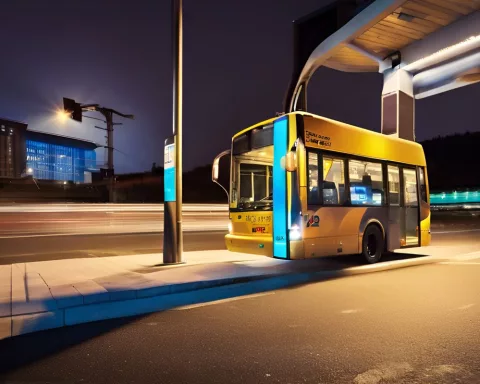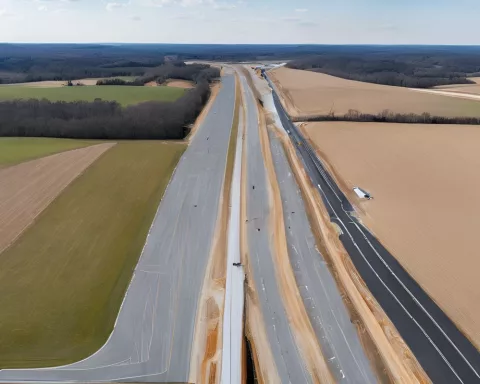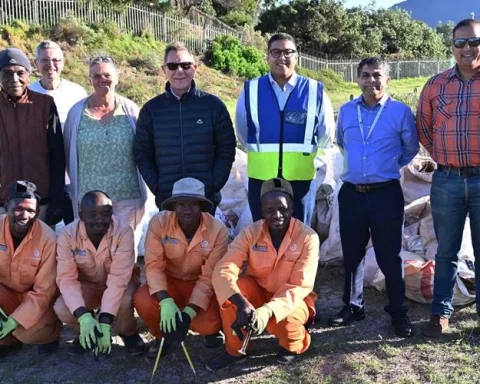Cape Town is taking a practical approach to urban mobility by prioritizing the repair and upkeep of existing infrastructure, enhancing public transportation services, and alleviating traffic congestion. The city has allocated over R3.5 billion for the 2024/25 fiscal year, with a focus on the MyCiTi bus service, road maintenance, and non-motorized transport options. The budget aims to ensure timely, safe, and economical mobility for residents, making it an excellent model for other cities to follow.
Cape Town’s Groundbreaking Approach to Urban Mobility
Cape Town’s Urban Mobility Directorate has prioritized the repair and upkeep of existing infrastructure, enhancement of public transportation services, and traffic congestion alleviation. The initiative has allocated over R3.5 billion for the 2024/25 fiscal year, with major focus on the MyCiTi bus service, road maintenance, and non-motorized transport options, among others. The budget aims to ensure timely, safe, and economical mobility for residents.
In a time when cities are often focused on flashy new developments, it’s refreshing to see Cape Town taking a pragmatic approach. The city’s Urban Mobility Directorate has decided to prioritize the repair and upkeep of existing infrastructure, enhancement of public transportation services, and traffic congestion alleviation. This commitment was recently emphasized in the ‘Building for Jobs Budget 2024/25’.
Investing in Today for a Better Tomorrow
The core of this initiative is the significant allocation of over R3.5 billion for the 2024/25 fiscal year, starting on 1 July 2024. Within this budget, a substantial R797 million is earmarked for the operation of the established [MyCiTi bus service](https://capetown.today/myciti-enhances-your-holiday-experience-late-night-shopping-and-fun-filled-excursions/). This public transportation system plays a crucial role in commuting Cape Town’s residents across the sprawling metropolis.
The importance of road maintenance in this plan cannot be overstressed. Considering the city’s road network extends nearly 10,700 km, it’s critical to upkeep this infrastructure. As such, R2.6 billion of the directorate’s operational budget will be assigned to road maintenance over the following three years, as stated by Councillor Rob Quintas, the City’s Mayoral Committee Member for Urban Mobility.
Medium-Term Budget and Key Projects
The medium-term budget, effective from 1 July 2024 to 30 June 2027, totals approximately R8.9 billion. Several key expenditure items include projects like the R6.5 billion expansion of the MyCiTi bus service to link Mitchells Plain and Khayelitsha with Wynberg and Claremont. This project also incorporates R620 million for extra buses, R438 million for building new stops and stations, and R386 million for improving public transport interchanges at Nolungile, Nyanga, Vuyani, and Nonkqubela.
The budget doesn’t merely aim to extend bus services, but also includes provisions for infrastructure enhancement. An allocation of R121 million will be employed for the upgrade of the Bellville and Wynberg public transport interchanges. Moreover, an additional R130 million will be spent on formalizing MyCiTi bus stops on existing routes and reconstructing damaged stations.
Traffic Congestion Relief and Non-Motorized Options
Efforts to alleviate traffic congestion also carry significant weight in the budget. A total of R444 million will be spent on road projects in areas like Kuils River, Durbanville, Belhar, Salt River, and along the M3, Maitland, Kommetjie Main Road, and Diep River. These areas typically suffer from heavy traffic.
In a notable move, the budget also includes provisions for non-motorized transport modes. It reserves R385 million for the development of universally accessible walkways and cycling lanes in regions including Mitchells Plain, Hanover Park, Kuils River, Khayelitsha, Gugulethu, and Heideveld.
Moreover, R397 million is designated for road rehabilitation and reconstruction. This allocation considers regions like Bonteheuwel/Uitsig, Heideveld, and the Southern Areas, coupled with the reconstruction of various sections of Jakes Gerwel Drive and Tafelberg Road.
On The Road to a More Mobile City
Cape Town’s determination to keep its citizens on the move is reinforced by an investment of R115 million towards the improvement and restoration of traffic signals across the city.
It’s evident that the city is eager to keep mobility in motion. All these measures aim to ensure that residents can reach their schools, workplaces, and other destinations in a timely, safe, and economical manner. As Councillor Quintas emphasizes, residents are encouraged to review the draft budget and provide their feedback by 30th April 2024, to make sure their opinions are accounted for.
Those interested in the specifics of the budget can find details on the city’s dedicated page www.capetown.gov.za/budget. For written comments, email Budget.Comments@capetown.gov.za or call 0800 212 176 for verbal inputs in English, Afrikaans, or isiXhosa. More information can be found at www.capetown.gov.za/HaveYourSay.
With its emphasis on preserving the road network, developing public transport, and minimising congestion, the ambitious ‘Building for Jobs Budget 2024/25’ has great potential to keep Cape Town on the move. This strategy, rooted in practicality and foresight, could serve as an excellent model for other cities to follow.
What is Cape Town’s approach to urban mobility?
Cape Town is taking a practical approach to urban mobility by prioritizing the repair and upkeep of existing infrastructure, enhancing public transportation services, and alleviating traffic congestion.
How much has Cape Town allocated for urban mobility in the 2024/25 fiscal year?
Cape Town has allocated over R3.5 billion for the 2024/25 fiscal year, with major focus on the MyCiTi bus service, road maintenance, and non-motorized transport options, among others.
What is the focus of Cape Town’s budget for urban mobility?
The budget aims to ensure timely, safe, and economical mobility for residents, making it an excellent model for other cities to follow.
What key projects are included in Cape Town’s medium-term budget?
The medium-term budget includes projects like the expansion of the MyCiTi bus service to link Mitchells Plain and Khayelitsha with Wynberg and Claremont, and the upgrade of the Bellville and Wynberg public transport interchanges.
How does Cape Town plan to alleviate traffic congestion?
Cape Town plans to alleviate traffic congestion by spending R444 million on road projects in areas that typically suffer from heavy traffic, like Kuils River, Durbanville, Belhar, Salt River, and along the M3, Maitland, Kommetjie Main Road, and Diep River.
What are the provisions for non-motorized transport modes in Cape Town’s budget?
The budget includes provisions for non-motorized transport modes, reserving R385 million for the development of universally accessible walkways and cycling lanes in regions including Mitchells Plain, Hanover Park, Kuils River, Khayelitsha, Gugulethu, and Heideveld.












